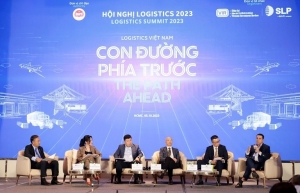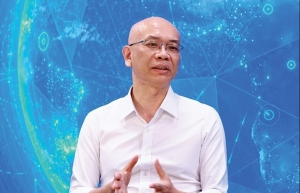Vietnam’s logistics landscape has scope for growth
 |
| Juergen Weber, chairman, Transportation and Logistics Sector Committee European Chamber of Commerce Vietnam |
Key infrastructure projects, including the planned completion of 3,000km of highways in 2025, the cargo railway connecting Lao Cai to Hanoi and Haiphong port, the anticipated North-South high-speed railway, Tan Son Nhat International Airport’s Terminal 3 set to be functional within the first half of the year, and the Long Thanh International Airport, are poised to bolster domestic economic activity significantly.
Alongside these advancements, ongoing government reforms to streamline administrative procedures, enhance regulatory clarity, and support sustainable industries will be critical in creating a more conducive environment for both domestic and foreign businesses.
The logistics landscape is characterised by numerous small players operating independently, leading to limited optimisation and inefficient route planning. This fragmentation results in higher operational costs and reduced competitiveness. To fully capitalise on these core infrastructure developments, logistics operators should adopt multimodal transport solutions, seamlessly integrating road, sea, and rail networks to optimise efficiency.
Vietnam’s logistics costs remain significantly higher than those of regional peers due to fragmented supply chains, bureaucratic red tape, and reliance on outdated processes. Inefficiencies in customs procedures, such as documentation delays and administrative bottlenecks, further increase operational expenses for businesses.
However, the ongoing digital transformation in Vietnam presents an opportunity to streamline these processes. The adoption of digital technologies is set to revolutionise logistics operations. These technologies can enhance real-time tracking, optimise supply chain management, and improve transparency in transactions.
The Transportation and Logistics Sector Committee (TLSC) has been at the forefront of advocating for streamlined and efficiency in customs procedures. One notable success was addressing the shortage of EUR.1 customs forms earlier in 2024.
Through the Business Confidence Index from the European Chamber of Commerce in Vietnam (EuroCham), members raised concerns about delays caused by the shortage. The TLSC worked with authorities to accelerate the issuance of additional forms, alleviating the bottleneck.
As Vietnam strives for economic growth, sustainability must remain a core priority. Green initiatives and digital transformation will ensure that progress is both environmentally sound and future-ready. A comprehensive approach will position Vietnam as a leading economic force in the region with long-term stability and prosperity.
The logistics sector is a significant contributor to carbon emissions, making environmental sustainability a growing concern. Vietnam’s commitments to carbon neutrality and global regulations such as the EU’s Carbon Border Adjustment Mechanism underscore the urgent need for greener supply chain solutions. Green logistics initiatives, such as the adoption of electric vehicles, energy-efficient warehouses, and optimised delivery routes, offer viable solutions.
The TLSC plays a role in this transition by facilitating dialogue between businesses and policymakers. By ensuring Vietnam’s regulatory framework supports sustainable logistics practices, the TLSC helps businesses align with global standards while maintaining profitability.
The rapid expansion of e-commerce and cross-border trade is transforming Vietnam’s logistics landscape. The rise of online shopping has led to increased demand for faster, more integrated logistics solutions, requiring enhanced warehousing, last-mile delivery capabilities, and cross-border customs efficiency.
Vietnam’s growing digital economy presents an opportunity for logistics providers to embrace AI-driven route optimisation, real-time tracking, and smart warehouses. These technologies improve delivery speed, reduce costs, and enhance customer satisfaction.
To support this shift, we continue to engage with authorities on regulatory frameworks that facilitate cross-border e-commerce. By advocating for streamlined customs clearance procedures and harmonised trade policies, the TLSC helps businesses capitalise on Vietnam’s expanding role as a regional e-commerce hub.
One of the most pressing challenges in Vietnam’s logistics sector is the shortage of skilled professionals. As logistics operations become increasingly digitalised and complex, the demand for expertise in supply chain management, data analytics, and automation is growing. The opportunity lies in fostering stronger collaboration between businesses and educational institutions to bridge this talent gap.
Facilitating more capability training workshops and enhancing public-private partnerships will be crucial. Active participation in dialogues with government agencies can help operators stay abreast of regulatory changes, advocate for favourable policies, and contribute to the sector’s development.
We have taken proactive steps in this regard. In September 2024, the TLSC hosted a pivotal training and dialogue session with the Ho Chi Minh City Customs Department, bringing together business leaders and customs officials to discuss regulatory developments and procedural efficiencies. These engagements provide critical platforms for knowledge exchange, ensuring that both businesses and authorities remain informed and prepared for future challenges.
 | Vietnamese government committed to boosting logistics infrastructure At the Vietnam Logistics Summit 2023 co-hosted by SPL Vietnam and VIR, representatives from the Vietnamese government reaffirmed the country's steadfast dedication to enhancing the nation's logistics infrastructure. |
 | Logistics infrastructure can enjoy a bright future Vietnam’s logistics industry needs to address bottlenecks such as congestion, delays, and high costs to create a breakthrough. Tran Thanh Hai, deputy director of the Agency of Foreign Trade under the Ministry of Industry and Trade, spoke with VIR’s Hai Yen about the keys to reducing logistics costs. |
What the stars mean:
★ Poor ★ ★ Promising ★★★ Good ★★★★ Very good ★★★★★ Exceptional
Related Contents
Latest News
More News
- Citi economists project robust Vietnam economic growth in 2026 (February 14, 2026 | 18:00)
- Sustaining high growth must be balanced in stable manner (February 14, 2026 | 09:00)
- From 5G to 6G: how AI is shaping Vietnam’s path to digital leadership (February 13, 2026 | 10:59)
- Cooperation must align with Vietnam’s long-term ambitions (February 13, 2026 | 09:00)
- Need-to-know aspects ahead of AI law (February 13, 2026 | 08:00)
- Legalities to early operations for Vietnam’s IFC (February 11, 2026 | 12:17)
- Foreign-language trademarks gain traction in Vietnam (February 06, 2026 | 09:26)
- Offshore structuring and the Singapore holding route (February 02, 2026 | 10:39)
- Vietnam enters new development era: Russian scholar (January 25, 2026 | 10:08)
- 14th National Party Congress marks new era, expands Vietnam’s global role: Australian scholar (January 25, 2026 | 09:54)

 Tag:
Tag:















 Mobile Version
Mobile Version